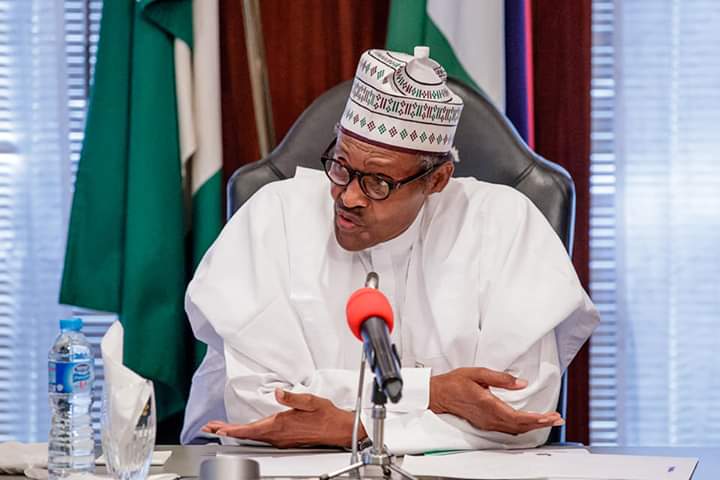President Muhammadu Buhari, on Monday, said there was need for the establishment of a special court that would solely entertain criminal cases, to enhance speedy administration and dispensation of justice in the country.
The President, who spoke at the opening ceremony of the 2019 biennial All Nigeria Judges Conference of Superior Courts, decried that cases are unduly delayed in courts, and called for urgent reforms in the judiciary.
He said his administration has already embarked on a number of justice sector reforms that would involve a review of extant laws and enactment of new laws that will improve the lives of Nigeria. He stressed that deliberations at the Judges conference should be focused on how to create “an efficient structure for the proposed Special Crimes Courts or the urgent designation of existing courts as Special Courts with competent and credible judicial officers in order to remove administrative bottlenecks in the judicial process”.
He said: “The government has been committed to a number of justice sector reforms such as review of extant laws and enactment of new laws that will improve the lives of Nigerians. “Additionally, we have worked closely with the Chief Justice of Nigeria to ensure that judicial budgetary allocations are enhanced in view of the needs of the judiciary.
“I have strongly supported the increase in number of judges at High Courts, Appeal Courts and the Supreme Court in order to reduce the burden of the work placed on judicial officers. I will continue to do so.
“Nevertheless, delay in justice delivery as well as the volume of cases on the dockets of courts still leaves much to be desired. Urgent reforms therefore remain imperative in the light of these challenges.
“I will encourage the judiciary to undertake a critical review and assessment of their needs in terms of technology, competent administrative, judicial personnel and welfare as well as skills required to make the Nigerian judiciary more innovative and in tune with modern judicial approaches.
“This is a journey that the executive arm has already started with the reform of the public service. It is time for the judiciary to adopt modern case management systems, initiate more expeditious case tracking and disposal systems and provide reward mechanisms for judges who maintain highest levels of integrity and efficiency.
“I have signed the Administration of Criminal Justice Act, 2015 and the Correctional Services Act, 2019 into law, it is my hope that the judiciary will support the efforts of this government by ensuring their effective implementation. These laws will provide a comprehensive legal and institutional framework to tackle delays in the dispensation of justice, prison congestion, awaiting trial inmates, and non-custodial measures.
“The Correctional Services law also seeks to bring Nigeria’s legal system and prison management procedures in line with international human rights standards. It is therefore my expectation that the judiciary will work closely with the Attorney General of the Federation, the heads of Prisons and other law enforcement agencies to actualize the objectives of these laws towards an improved criminal justice system.
“We have, as a nation, taken giant strides in the consolidation of our democratic status by holding successful civilian-to-civilian transitions six times since 1999. This exercise has strenuously taxed the resilience not only of our people but also our democratic institutions, notably the judiciary”. Besides, President Buhari applauded the judiciary which it said improved its ability to timeously conclude election cases.
“I am proud to observe that the judiciary both before and after elections has improved in its ability to conclude election matters in a timely manner. There is still room for improvement and I urge the Chief Justice to initiate a study to understand the challenges of adjudicating election matters and to advise me on the steps that the executive can take to address those challenges.
“We are committed to strengthening our democracy by honouring the dictates of the separation of powers among the three arms of government. In this regard, Section 124 (3) Constitution of the Federal Republic of Nigeria, 1999 (4th Alteration) and the Presidential Implementation Committee on Autonomy of State Legislature and State Judiciary, which I inaugurated last year has forwarded recommendations that will genuinely empower the Legislature and the Judiciary to carry out their respective constitutional roles without interference from the Executive.
“Permit me to presume the continued cooperation of the Judiciary in achieving these mutually beneficial objectives in the overall interest of our country”, he added.
In his remarks, the Chief Justice of Nigeria, Justice Tanko Muhammad implored judges across the federation to desist from delivering judgements based on technicalities. Noting that the judiciary was determined to fully automate all the courts in the country, the CJN, said judges must redouble their effort so as to be able to sustain public confidence in the judiciary.
“I must not fail to mention however, that in order to sustain public confidence in the Judiciary, Judges must continue to be proactive by not allowing technicalities to stand in the way of substantive justice.
“Technicalities in itself sometimes constitute unreasonable delay in dispensing with cases. Having said this, I must not fail to emphasize that the timely disposition of cases in our Courts will in no small measure shore up public confidence in the Judiciary”, the CJN added.
He identified delay in justice delivery and large volume of cases on the dockets of Courts as major problems that would be tackled through urgent reforms in the judiciary.







